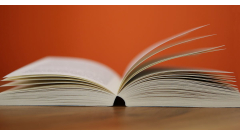Communicating effectively is a vital skill in both personal and professional settings, and mastering it can open up countless opportunities. In a world brimming with information, expressing ourselves clearly and precisely is more crucial than ever. Whether you're drafting an email, making a presentation, or engaging in conversation, utilizing tools like Merriam-Webster’s Thesaurus can elevate your language and refine your expression.
This how-to guide offers actionable insights on how to utilize this powerful resource for enhancing your communication skills. By leveraging synonyms, antonyms, and nuanced meanings, you can articulate your thoughts with greater clarity, creating a lasting impression on your audience. Let’s embark on this journey to articulate with finesse!
Merriam-Webster's Dictionary and Thesaurus is a comprehensive resource perfect for anyone seeking to enhance their language skills. By providing a vast array of synonyms and antonyms, this handy paperback equips readers with the tools necessary to communicate more effectively. It is not only a dictionary but a bridge to more refined expression, allowing users to articulate their thoughts with clarity and precision. Ideal for students, professionals, and anyone passionate about language, this thesaurus offers insights that transform word usage into an art form.
Start with Synonyms
Using Merriam-Webster's Thesaurus effectively starts with the fundamental step of looking up a word. Begin by locating the thesaurus section of the Merriam-Webster's Dictionary and Thesaurus, which is easily accessible in a mass-market paperback format. Once you’ve found it, think of the word you wish to explore more deeply. For instance, if you’re interested in the word "happy," flip to the corresponding letter or use the alphabetical guide to find "happy." Once located, there will be a list of synonyms presented, which can include terms like "joyful," "elated," or "content." Each synonym can enhance your communication by adding nuance and specificity.
When selecting a synonym, it’s essential to consider the context in which you’ll use it. Not every synonym is interchangeable; some might carry different connotations or fit better in certain scenarios. For example, while "joyful" conveys a sense of exuberance, "content" suggests a more subdued pleasure. To make the best choice, think about the emotion you want to convey and the audience you are addressing. This awareness not only enriches your vocabulary but also allows for more precise expression.
- Locate the word in the thesaurus.
- Examine the list of synonyms and their related meanings.
- Choose a synonym based on the context of your message.
- Experiment with different options to see which works best for your intent.
Explore Antonyms
Improving your communication skills can significantly boost your effectiveness, and one powerful tool at your disposal is the Merriam-Webster's Dictionary and Thesaurus. By utilizing this resource, you can find not only synonyms but also antonyms, which are essential for adding nuance and clarity to your expression. To begin exploring antonyms, open your copy of Merriam-Webster's Thesaurus and follow these simple steps: first, locate the word you want to find an antonym for. Once you've identified the correct entry, look for the list of antonyms provided. This list will usually be found near synonyms, making it easy to slide from one to the other. For instance, if you search for "happy," you will see antonyms like "sad," "unhappy," and "mournful." Each antonym can be used in different contexts, so understanding their connotations is vital.
Incorporating antonyms into your dialogue or writing enhances your communication by allowing you to express contrasting ideas more effectively. Imagine you're in a meeting discussing project outcomes. Instead of stating, “the project was successful,” you might say, “the project was not only successful; it was dismal in its lack of engagement.” This use of antonyms emphasizes your point and paints a clearer picture. When using them, consider the following tips to ensure effective incorporation:
- Choose antonyms that fit the tone of your message.
- Be cautious of overly complex or obscure antonyms that may confuse your audience.
- Practice makes perfect; try using antonyms in casual conversations to build confidence.
Use in Context
Merriam-Webster's Dictionary and Thesaurus, Mass-Market Paperback serves as an invaluable tool for enhancing communication skills. To make the most of this resource, begin by choosing a word you frequently use. Then, consult the thesaurus section to discover a range of synonyms and antonyms. It's not merely about finding a new word; instead, delve into the nuances of each synonym. For instance, the word "happy" may have synonyms like "joyful," "cheerful," or "content." However, each of these words carries subtle differences in meaning and usage. Understanding these distinctions is crucial for more effective communication.
To practice, create original sentences with these new words. Using our earlier example, you could say: "The joyful child played in the park." Now, try a sentence utilizing a different synonym: "She felt cheerful during the sunny afternoon." In both instances, while the core sentiment is similar, the word choice adds layers to the expression. This exercise will help you internalize the words, making them a natural part of your vocabulary.
- Challenge yourself by writing sentences that use antonyms as well, such as "sad" for "happy."
- Consider the context in which you want to convey emotions or ideas and select words that align with that context.
Expand Vocabulary
Improving your communication skills is an enriching journey, and Merriam-Webster's Dictionary and Thesaurus serves as a fantastic resource on this path. By delving into different sections of the thesaurus, you unlock a world of synonyms and antonyms, enabling you to articulate thoughts with precision and flair. Take a moment each day to explore a new section, selecting unfamiliar words that resonate with you. Make it a habit to jot down these discoveries; you'll be surprised at how quickly your vocabulary grows. Engaging with various sections regularly not only broadens your language skills but also instills a sense of curiosity and playfulness in learning.
To turn vocabulary expansion into an exciting daily challenge, consider choosing a new word every morning. Set a goal to use this word in conversation, writing, or even social media posts throughout the day. This practice will not only enhance your memory of the word but also showcase your expanding lexicon to others. Incorporate some of these exercises into your routine:
- Choose a theme for the week (e.g., emotions, actions, descriptions) and find associated words each day.
- Challenge yourself to write a short story or poem using at least five new synonyms you’ve learned.
- Engage a friend in the challenge; share your new words and use them in discussions to keep each other motivated.
Enhance Writing Style
Improving communication skills goes hand in hand with refining your writing style. One powerful tool for achieving this is Merriam-Webster's Dictionary and Thesaurus. This resource allows you to delve deeper into your vocabulary, helping you identify and eliminate repetitive word use while replacing weaker words with vivid alternatives. Start by analyzing your writing for common words that appear frequently. For instance, if you notice the word "good" cropping up repeatedly, consult the thesaurus and discover more expressive choices like "excellent," "superb," or "remarkable." This not only enhances your text but also keeps your audience engaged.
As you make these changes, consider specific phrases that can sound monotonous if used too often. Words like "said" and "happy" can easily become dull, but alternatives such as "asserted" or "joyful" can bring your writing to life. Here are some examples of substitutions you can make:
- Replace "very big" with "enormous" or "immense."
- Swap "really smart" for "intelligent" or "brilliant."
- Use "swift" instead of "very fast."
- Explore dynamic word choices that resonate with your audience.
- Utilize the thesaurus to hunt for adjectives that spice up your descriptions.
Practice Alliteration
Alliteration is the artful repetition of initial consonant sounds in neighboring words, and it can significantly enhance the rhythm and appeal of your writing. This delightful tool not only grabs attention but also makes phrases more memorable. When you utilize alliteration, you create a musicality that can captivate your audience, drawing them into your message. As you explore the rich features of Merriam-Webster's Dictionary and Thesaurus, you can easily discover synonyms that fulfill your alliterative aspirations. By experimenting with words that start with the same letter, you can craft compelling sentences that echo in the minds of your readers.
To practice this technique effectively, consider incorporating the following exercises into your writing routine:
- Choose a theme or subject that interests you.
- Use Merriam-Webster's Thesaurus to identify synonyms related to your theme that begin with the same letter.
- Create a list of engaging alliterative phrases or sentences based on the synonyms you find.
- Experiment with different combinations until you create a rhythm that resonates with your style.
- Challenge yourself by using alliteration in both formal and informal communication.
Create Word Maps
Creating visual word maps is an engaging way to enhance your vocabulary and strengthen your communication skills using Merriam-Webster's Dictionary and Thesaurus. By visually connecting synonyms and antonyms, you can better understand the relationships between words, ultimately leading to more effective expression in both writing and speaking. To get started, gather your materials: a large sheet of paper or a whiteboard, colored markers or pens, and of course, your Merriam-Webster's Thesaurus. Begin with a central word that you want to explore—this could be a word you frequently use or one you find fascinating.
Next, follow these steps:
- Write the central word in the middle of the paper.
- Look up the word in your thesaurus and jot down its synonyms and antonyms on the paper.
- Use lines or arrows to connect the synonyms directly to the central word, illustrating how they relate.
- Do the same for antonyms, connecting them on the opposite side to visualize contrasts.
- Consider adding additional layers by branching out from the synonyms and antonyms to explore further related words or phrases, creating a more complex map.
- Color-code different sections for synonyms and antonyms to enhance clarity and visual appeal.
- Explore idiomatic expressions that relate to your central word.
- Add emotional connotations or contexts for usage beside each word.
- Incorporate images or symbols that resonate with the meanings of the words for a richer experience.
Related Products
Tailor Tone and Style
Choosing the right synonym using Merriam-Webster's Dictionary and Thesaurus can significantly influence the tone of your writing. The nuances of synonyms allow you to convey emotion and precision, tailoring your message to resonate with your target audience. For instance, consider the word "happy." Alternatives like "joyful" or "elated" can elevate the emotional impact, suggesting a deeper feeling than the more casual "happy." Similarly, using "content" introduces a sense of satisfaction rather than exuberance. This careful selection shapes not just the meaning, but also the experience of reading your text.
The Merriam-Webster Thesaurus aids in honing your word choices to fit various contexts. For example, when addressing a formal audience, you might prefer "assist" instead of "help," as it reflects professionalism. Conversely, in casual conversations, "help" carries a friendly tone. The way a word is perceived can fluctuate based on its connotation; thus, selecting the right synonym is paramount. Here are some synonyms to illustrate different tones:
- Angry: "irate," "furious," "exasperated."
- Surprised: "astonished," "astounded," "flabbergasted."
- Beautiful: "gorgeous," "stunning," "exquisite."
Revise and Edit
Using Merriam-Webster's Dictionary and Thesaurus during the revision process can significantly enhance your writing. Start by identifying parts of your text that feel lackluster or overly simplistic. Common words might serve a purpose, but they can also lead to dull prose. As you read through your draft, pay attention to adjectives and verbs that seem weak or repetitive. These are excellent candidates for stronger alternatives.
After pinpointing these areas, open Merriam-Webster's Thesaurus. Instead of simply substituting every familiar word with a synonym, aim for precision and context. Consider the tone of your writing; a more dynamic word can elevate your expression, but it should also maintain the intended meaning. Utilize the thesaurus to explore options that might resonate better with your audience while enhancing clarity and impact.
- Focus on verbs that drive action—words like "run" can become "sprint" or "dash," adding energy.
- Look for adjectives that can add richness—"good" may be replaced with "excellent" or "superb."
- Balance the use of synonyms. A variety of word choices can create a more engaging narrative without overwhelming the reader.
- Check the definitions in the dictionary to make sure your new word aligns with your intended meaning, avoiding any potential confusion.
Practice Engagement Strategies
Improving communication skills is an essential aspect of effective expression, and utilizing Merriam-Webster's Dictionary and Thesaurus is a brilliant way to enhance your vocabulary and make your messages more engaging. To draw in your listeners or readers, consider implementing varied vocabulary that resonates with them. The thesaurus not only expands your lexicon but also allows you to replace mundane terms with more vibrant alternatives, thereby capturing attention and evoking emotions. For instance, the word “happy” can be enhanced with synonyms such as “delighted,” “elated,” or “jubilant,” each possessing distinct nuances that can shift the tone and impact of your message considerably.
Strategically choosing words is paramount for persuasive communication. Here are several techniques that can effectively enhance engagement:
- Utilize vivid imagery through descriptive adjectives: Replace generic terms like “big” with “gigantic” or “enormous” to paint a clearer picture.
- Incorporate action-oriented verbs to energize your narrative. Instead of saying “said,” opt for “remarked,” “proclaimed,” or “exclaimed” to convey more emotion.
- Choose words that reflect the audience’s perspective; knowing your audience allows you to tailor your expression for maximum impact.
- Experiment with connotative meanings: Words carry emotional weight, so selecting terms with positive or negative connotations can influence reader or listener reactions.
By thoughtfully engaging with Merriam-Webster's Thesaurus, you enhance your ability to communicate in a way that captivates and holds attention. This resource encourages a habit of seeking out rich vocabulary alternatives, helping you craft messages that not only inform but also inspire and persuade.
- Make it a practice to regularly explore synonyms for commonly used words in your daily communication.
- Engage in exercises that prompt you to describe experiences or emotions using different words sourced from the thesaurus.
Why We Chose This Product
Choosing Merriam-Webster's Thesaurus for this guide was an easy decision because it stands out as a reliable and user-friendly tool for anyone looking to improve their vocabulary. Its vast database of words not only helps users find the perfect term but also enriches their understanding of language. This resource empowers individuals to express themselves more precisely and confidently, making it a valuable companion in communication.
- Comprehensive collection of synonyms and antonyms
- Easy-to-navigate structure for quick reference
- Enhances vocabulary and articulate expression
- Trusted source with a reputation for accuracy
Ultimately, applying the techniques highlighted in this guide will enable you to wield words effectively, transforming your communication into a powerful tool that resonates and engages.
Merriam-Webster's Dictionary and Thesaurus is a comprehensive resource perfect for anyone seeking to enhance their language skills. By providing a vast array of synonyms and antonyms, this handy paperback equips readers with the tools necessary to communicate more effectively. It is not only a dictionary but a bridge to more refined expression, allowing users to articulate their thoughts with clarity and precision. Ideal for students, professionals, and anyone passionate about language, this thesaurus offers insights that transform word usage into an art form.










